小学英语科普版五年级下册Lesson 6 Revision课件
文档属性
| 名称 | 小学英语科普版五年级下册Lesson 6 Revision课件 |
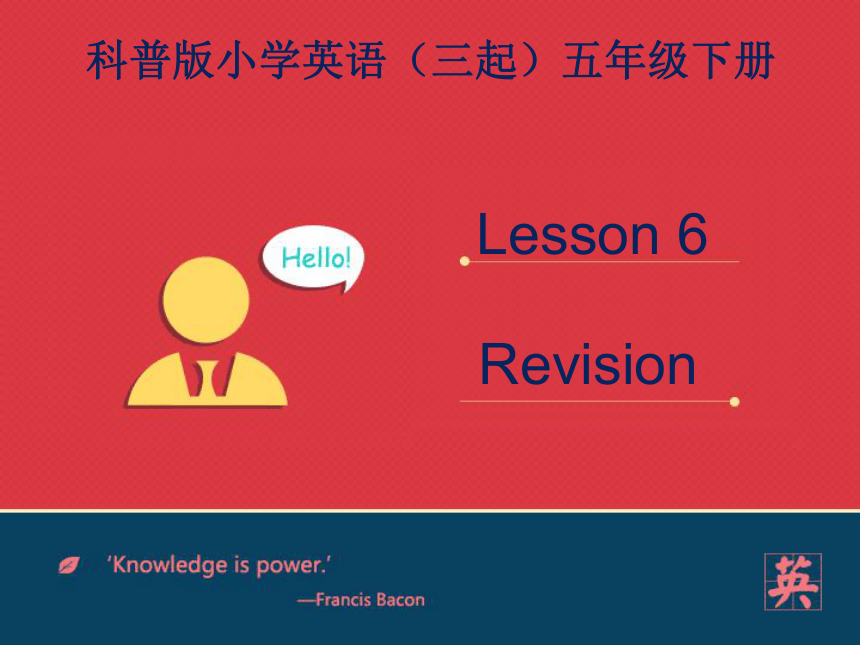
|
|
| 格式 | zip | ||
| 文件大小 | 2.2MB | ||
| 资源类型 | 教案 | ||
| 版本资源 | 科学普及版 | ||
| 科目 | 英语 | ||
| 更新时间 | 2016-01-18 00:00:00 | ||
图片预览

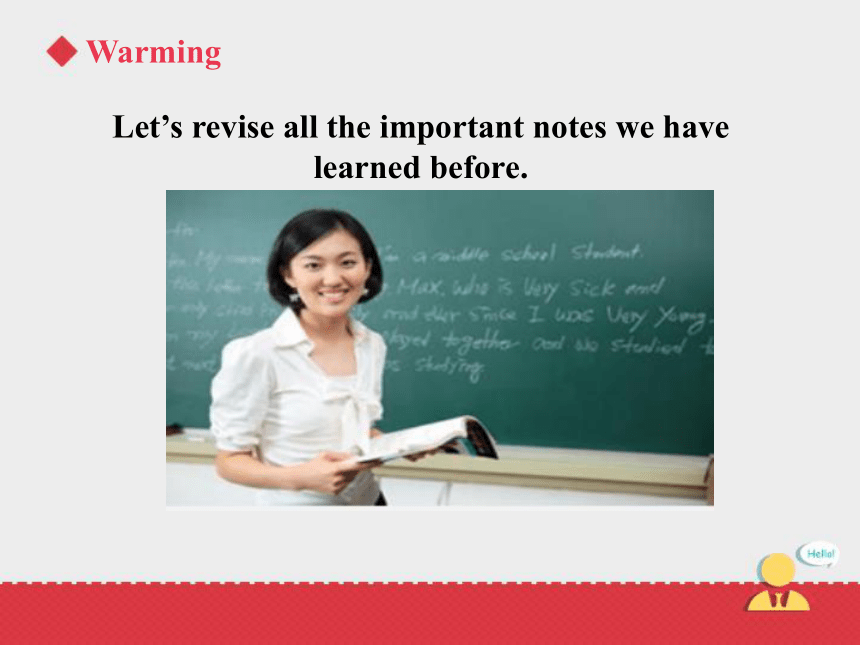
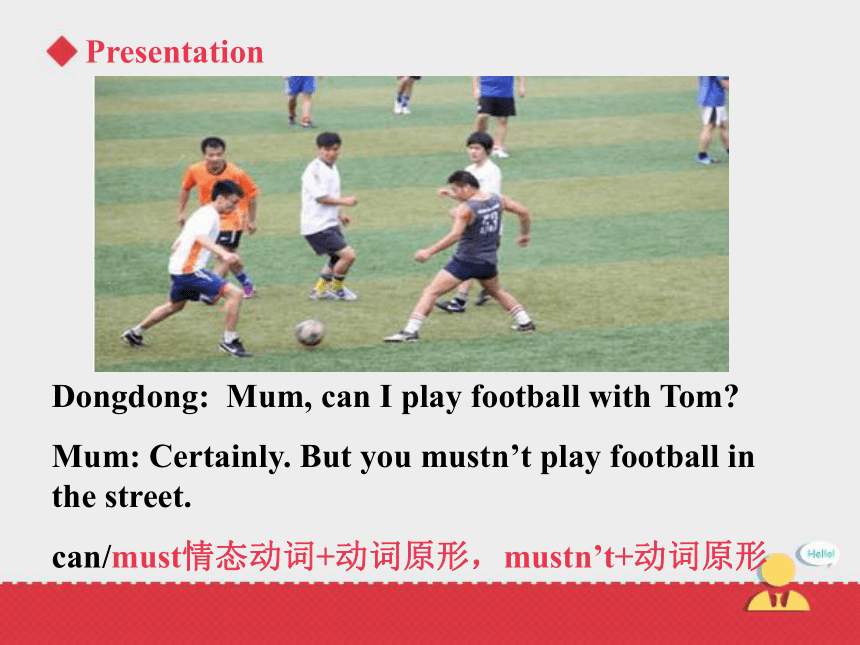

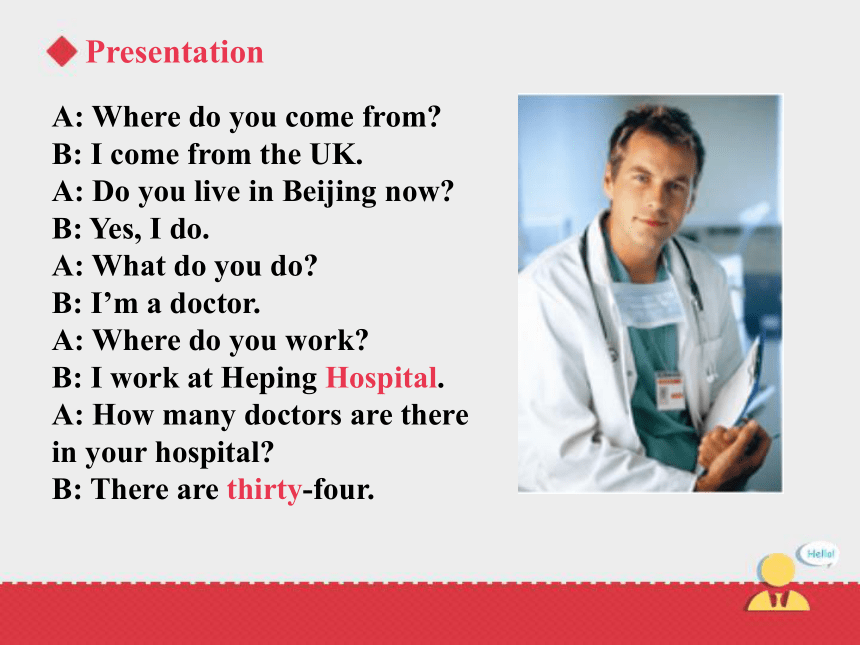
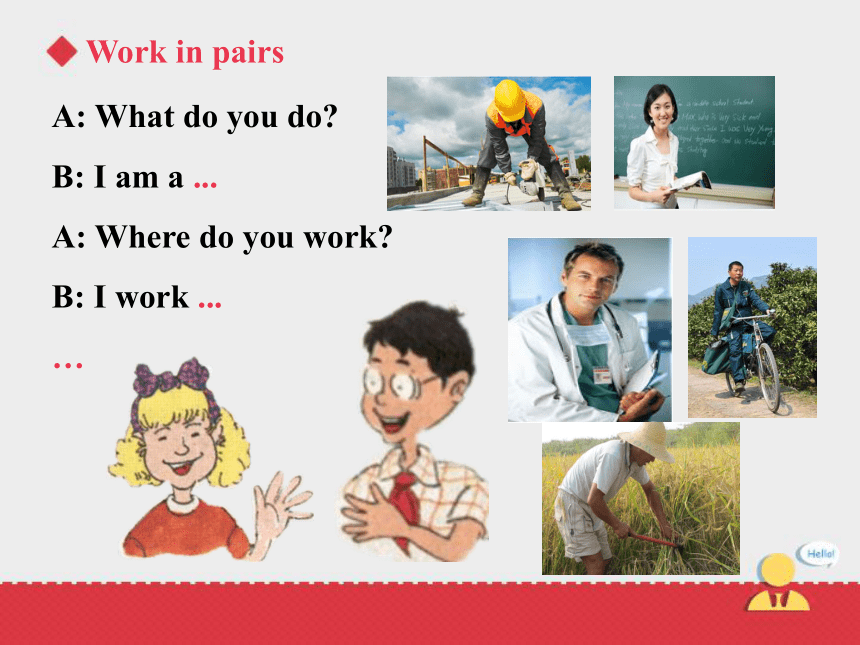
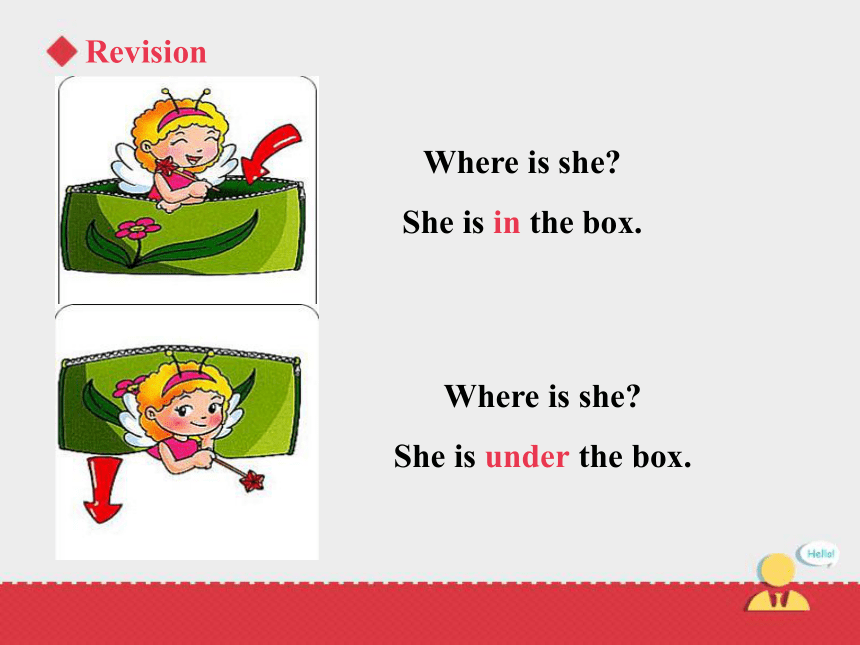
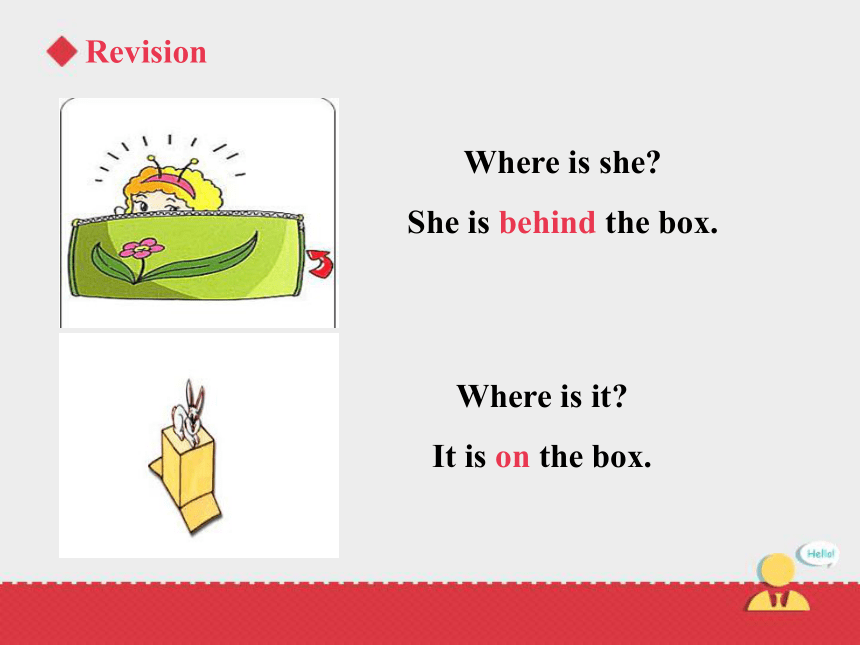
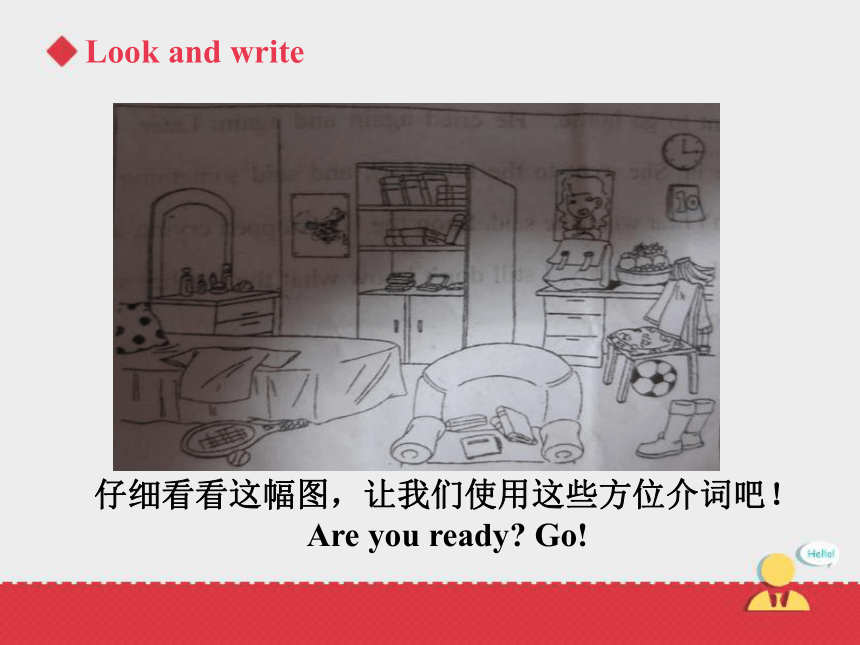
文档简介
课件21张PPT。科普版小学英语(三起)五年级下册Lesson 6RevisionWarming Let’s revise all the important notes we have learned before. Presentation Dongdong: Mum, can I play football with Tom?
Mum: Certainly. But you mustn’t play football in the street.
can/must情态动词+动词原形,mustn’t+动词原形 Work in pairsCan I …?Yes, you can.
No, you can’t. PresentationA: Where do you come from?
B: I come from the UK.
A: Do you live in Beijing now?
B: Yes, I do.
A: What do you do?
B: I’m a doctor.
A: Where do you work?
B: I work at Heping Hospital.
A: How many doctors are there in your hospital?
B: There are thirty-four.Work in pairs A: What do you do?
B: I am a ...
A: Where do you work?
B: I work ...
… Revision Where is she?
She is in the box.Where is she?
She is under the box. RevisionWhere is she?
She is behind the box.Where is it?
It is on the box. Look and write仔细看看这幅图,让我们使用这些方位介词吧!Are you ready? Go! Exercise on, under, beside, near, inThis is Tom’s room. What can you see _____ this room? We can see a bed, two desks and two chairs. ______the bed there is a teddy bear. _______ the teddy bear is a bag. There is a desk _______ the window. There are some books and a pencil box ______ the desk. ____ the pencil box there is a pen, a pencil and an eraser. _____ the desk there is a chair. _______ the chair there is a cat.inOnBesidenearInonUnderUnderGrammar 情态动词can,may,must的用法
一、明显区分:
l.只可用can(could),表示“能力” (体力、知识、技能)
2. may:用于祈使句,表示祝愿。May you succeed!
3. must:表示必须 You must come in time.
二、表示“请求”或“许可”。
can、may、must都可用,但语气和程度不同。
1.can(could)用于各种句型和大部分人称。
例:①肯定句:You(He,We)can go now.
②否定句:You(He,We)can’t go now.
③疑问句:Can I (you,he)go now? Yes, you can.(No,you can’t.)
2.may(might)用于各种句型,但在肯定句和否定句中不用于第一称;在疑问句中不用于第二人称。
? 例:①肯定句:You(He)may go now.
????? ②否定句:You(He)may not go now.
③疑问句:May I(he)go now?
肯定回答:Yes,you may.(Yes, you can)
(否定)No,you may not.(No,you can’t./No,you mustn’t.)
口语化回答:(肯定)Yes,please.(Certainly.)
(否定)No,please don’t.(No,of course not.)
?3.must用于各种句型和大部分人称。
例:①肯定句:I(You,He)must go now.
?②否定句:You(He)mustn’t go now.
③疑问句:Must(you,he)go now?
肯定回答:Yes,you must.
否定回答:No,you needn’t.(No,you don’t have to.)Exercise - _____ (May, Must) I ask you a question? – Certainly.
You ______ (mustn’t, can) play football in the street.
The boy is good at swimming. He _____ (may, can) swim well.
- _______(Can, Must) you ride a bike? -Yes.
You ______(can, mustn’t) waste water(浪费水). You _______ (must, can) save water(节约用水).Maymustn’tcanCanmustn’tmustLet’s do it. Certainly. Here you are.
There are fourteen.
This is Mr. Black speaking.
Certainly. It’s 6-2-0-1-6-2-4-5.
OK.
I live in New York.
I am a worker.
He works in a school.
May I speak to Mr. Black?
Where do you live?
What do you do?
May I use your pen?
Where does your father work?
You mustn’t play football in the street.
How many books are there on the desk?
May I have your number?36718524 Listen and say fourteen + eighteen +_________ = fifty-two
+ + +
Thirty + _________ + one = forty-four
+ + +
________ + twelve + six = thirty-four
‖ ‖ ‖
sixty forty-three twenty-seventwentythirteensixteenWork in pairs Fill the blanks and then make similar dialogues with your partner — What do you do?
— I’m a _______.
— Where do you work?
— I work in _____________.
2. — What do you do?
— _________________.
— Where do you work?
— ___________ in a factory.doctora hospitalI’m a workerI workWork in pairs Fill the blanks and then make similar dialogues with your partner — What ____________?
— I’m a _______.
— Where ___________?
— I work in _____________.
2. — What ___________?
— I’m _____________.
— Where ____________?
— I work ______________.do you doa restaurantcookdo you workdo you doa teacherdo you workin a school Reading 1.-Do you live in Moscow, Nick? -________________
2.-Do you live in New York, Hans? -________________
3.-Where do you come from, Mary? -___________________
4.-Where do you come from, Liu Lei? -________________Look at the map and answer the questions.No, I don’t.Yes, I do.I come from London.I come from Beijing. Work in pairsWhere do you come from?I come from …
And you?Summary本课重点句型:
What do you do?
I’m a +职业.
Where do you work?
I work +地点介词短语.
Where do you come from?
I come from +地点.
on, in, under, beside等介词的用法.
can, may, must情态动词的使用.Homework.
课下完成学生课本37页内容.The End
Mum: Certainly. But you mustn’t play football in the street.
can/must情态动词+动词原形,mustn’t+动词原形 Work in pairsCan I …?Yes, you can.
No, you can’t. PresentationA: Where do you come from?
B: I come from the UK.
A: Do you live in Beijing now?
B: Yes, I do.
A: What do you do?
B: I’m a doctor.
A: Where do you work?
B: I work at Heping Hospital.
A: How many doctors are there in your hospital?
B: There are thirty-four.Work in pairs A: What do you do?
B: I am a ...
A: Where do you work?
B: I work ...
… Revision Where is she?
She is in the box.Where is she?
She is under the box. RevisionWhere is she?
She is behind the box.Where is it?
It is on the box. Look and write仔细看看这幅图,让我们使用这些方位介词吧!Are you ready? Go! Exercise on, under, beside, near, inThis is Tom’s room. What can you see _____ this room? We can see a bed, two desks and two chairs. ______the bed there is a teddy bear. _______ the teddy bear is a bag. There is a desk _______ the window. There are some books and a pencil box ______ the desk. ____ the pencil box there is a pen, a pencil and an eraser. _____ the desk there is a chair. _______ the chair there is a cat.inOnBesidenearInonUnderUnderGrammar 情态动词can,may,must的用法
一、明显区分:
l.只可用can(could),表示“能力” (体力、知识、技能)
2. may:用于祈使句,表示祝愿。May you succeed!
3. must:表示必须 You must come in time.
二、表示“请求”或“许可”。
can、may、must都可用,但语气和程度不同。
1.can(could)用于各种句型和大部分人称。
例:①肯定句:You(He,We)can go now.
②否定句:You(He,We)can’t go now.
③疑问句:Can I (you,he)go now? Yes, you can.(No,you can’t.)
2.may(might)用于各种句型,但在肯定句和否定句中不用于第一称;在疑问句中不用于第二人称。
? 例:①肯定句:You(He)may go now.
????? ②否定句:You(He)may not go now.
③疑问句:May I(he)go now?
肯定回答:Yes,you may.(Yes, you can)
(否定)No,you may not.(No,you can’t./No,you mustn’t.)
口语化回答:(肯定)Yes,please.(Certainly.)
(否定)No,please don’t.(No,of course not.)
?3.must用于各种句型和大部分人称。
例:①肯定句:I(You,He)must go now.
?②否定句:You(He)mustn’t go now.
③疑问句:Must(you,he)go now?
肯定回答:Yes,you must.
否定回答:No,you needn’t.(No,you don’t have to.)Exercise - _____ (May, Must) I ask you a question? – Certainly.
You ______ (mustn’t, can) play football in the street.
The boy is good at swimming. He _____ (may, can) swim well.
- _______(Can, Must) you ride a bike? -Yes.
You ______(can, mustn’t) waste water(浪费水). You _______ (must, can) save water(节约用水).Maymustn’tcanCanmustn’tmustLet’s do it. Certainly. Here you are.
There are fourteen.
This is Mr. Black speaking.
Certainly. It’s 6-2-0-1-6-2-4-5.
OK.
I live in New York.
I am a worker.
He works in a school.
May I speak to Mr. Black?
Where do you live?
What do you do?
May I use your pen?
Where does your father work?
You mustn’t play football in the street.
How many books are there on the desk?
May I have your number?36718524 Listen and say fourteen + eighteen +_________ = fifty-two
+ + +
Thirty + _________ + one = forty-four
+ + +
________ + twelve + six = thirty-four
‖ ‖ ‖
sixty forty-three twenty-seventwentythirteensixteenWork in pairs Fill the blanks and then make similar dialogues with your partner — What do you do?
— I’m a _______.
— Where do you work?
— I work in _____________.
2. — What do you do?
— _________________.
— Where do you work?
— ___________ in a factory.doctora hospitalI’m a workerI workWork in pairs Fill the blanks and then make similar dialogues with your partner — What ____________?
— I’m a _______.
— Where ___________?
— I work in _____________.
2. — What ___________?
— I’m _____________.
— Where ____________?
— I work ______________.do you doa restaurantcookdo you workdo you doa teacherdo you workin a school Reading 1.-Do you live in Moscow, Nick? -________________
2.-Do you live in New York, Hans? -________________
3.-Where do you come from, Mary? -___________________
4.-Where do you come from, Liu Lei? -________________Look at the map and answer the questions.No, I don’t.Yes, I do.I come from London.I come from Beijing. Work in pairsWhere do you come from?I come from …
And you?Summary本课重点句型:
What do you do?
I’m a +职业.
Where do you work?
I work +地点介词短语.
Where do you come from?
I come from +地点.
on, in, under, beside等介词的用法.
can, may, must情态动词的使用.Homework.
课下完成学生课本37页内容.The End
同课章节目录
- Lesson 1 May I speak to Mary?
- Lesson 2 We mustn't cross the street now
- Lesson 3 How many pupils are there?
- Lesson 4 Where do you live?
- Lesson 5 What do you do?
- Lesson 6 Revision
- Lesson 7 It's seven thirty-five
- Lesson 8 What day is it today?
- Lesson 9 Do you always have lunch at twelve?
- Lesson 10 Does she always come before six thirty?
- Lesson 11 When do you usually get up?
- Lesson 12 Revision
